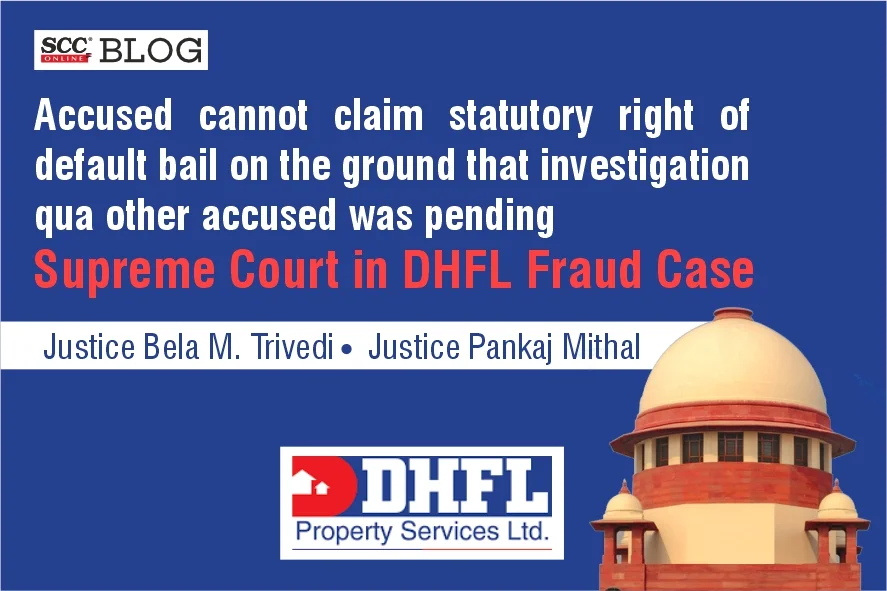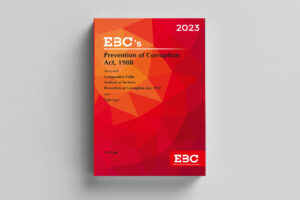Supreme Court: In a criminal appeal filed by the Central Bureau of Investigation (‘CBI’) against the order passed by the Delhi High Court upholding the order dated 03-12-2022 passed by the Special Judge, by which Kapil Wadhawan and Dheeraj Wadhawan (‘accused persons’) have been granted default bail under Section 167(2) of the Code of Criminal Procedure, 1973 (‘CrPC’) , the division bench of Bela M. Trivedi* and Pankaj Mithal, JJ. while setting aside the impugned orders, held that chargesheet having been filed against the accused persons within the prescribed time limit and the cognizance having been taken by the Special Court of the offences allegedly committed by them, the accused persons could not have claimed the statutory right of default bail under Section 167(2) on the ground that the investigation qua other accused was pending.
Background:
An FIR was registered by DGM, Union Bank of India for the offences punishable under Section 120-B r/w Section 409, 420 and 477-A of the Penal Code, 1860 (‘IPC’) and Section 13(2) read with Section 13(1)(d) of Prevention of Corruption Act, 1988, against Dewan Housing Finance Corporation Ltd. (‘DHFL’) and 12 other accused persons/companies. It was alleged that Kapil Wadhawan, the then Chairman and Managing Director, DHFL, along with 12 other accused persons entered into a criminal conspiracy to cheat the consortium of 17 banks led by Union Bank of India, and in pursuance to the said criminal conspiracy, the said accused persons/entities induced the consortium banks to sanction huge loans aggregating to Rs. 42,000 crores approx. and thereafter they siphoned off and misappropriated a significant portion of the said funds by falsifying the books of account of DHFL and deliberately and dishonestly defaulted on repayment of the legitimate dues of the said consortium banks, and thereby caused a wrongful loss of Rs. 34,000 crores to the consortium lenders during the period January, 2010 to December 2019.
The accused persons were arrested by the CBI and were remanded to judicial custody on 30-07-2022. After carrying out the investigation, a chargesheet for the offences under Section 120B read with Sections 206, 409, 411, 420, 424, 465, 468 and 477-A of IPC and Section 13(2) read with Section 13(1)(d) of PC Act came to be filed by the CBI against 75 persons/entities on 15-10-2022
The accused persons filed an application under Section 167(2) of CrPC on 29-102022 before the Special Court seeking statutory bail on the ground that the chargesheet filed by the CBI was incomplete and no final report as defined under Section 173(2) CrPC was filed within the statutory period provided under Section 167(2) CrPC., or in the alternative seeking their release from judicial custody in view of lack of jurisdiction of the court as there was no approval under Section 17-A of the PC Act as amended in 2018. Thereafter, the Special Court vide the order dated 03-12-2022, held that the investigation was incomplete and the chargesheet filed was in piecemeal, thus the accused persons were entitled to the statutory bail under Section 167(2) CrPC. Thereafter, CBI filed a petition before the High Court under Section 482 read with Section 439(2) of CrPC. The High Court vide the impugned order dismissed the said petition and upheld the order passed by the Special Court.
Issue: Whether the accused persons were entitled to the benefit of the statutory right conferred under the proviso to sub section 2 of Section 167 CrPC, on the ground that the investigation qua some of the accused named in the FIR was pending, though Chargesheet was filed within the prescribed time limit and though the cognizance of the offence was taken by the special court before the consideration of the application of the respondents seeking default bail under Section 167(2) CrPC?
After perusing Sections 167 and 173, the Court reiterated that the right of default bail under Section 167(2) CrPC is not only a statutory right but is a right that flows from Article 21 of the Constitution of India. It is an indefeasible right, and it is enforceable only prior to the filing of the challan or the chargesheet and does not survive or remain enforceable on the challan being filed, if already not availed of. Once the challan has been filed, the question of grant of bail must be considered and decided only with reference to the merits of the case under the provisions relating to grant of bail to the accused after the challan’s filing.
In the instant case the accused persons were arrested on 19-07-2022, and the chargesheet was filed by the CBI on 15-10-2022.
After placing reliance on K. Veeraswami v. Union of India, (1991) 3 SCC 655, the Court said that the statutory requirement of the report under Section 173 (2) would be complied with if the various details prescribed therein are included in the report. The report under Section 173 is an intimation to the court that upon investigation into the cognizable offence, the investigating officer has been able to procure sufficient evidence for the court to inquire into the offence and the necessary information is being sent to the court. The report is complete if it is accompanied by all the documents and statements of witnesses as required by Section 175 (5). It is not necessary that all the details of the offence be stated.
It added that the benefit of proviso appended to sub-section (2) of Section 167 CrPC would be available to the offender only when a chargesheet is not filed and the investigation is kept pending. Once a chargesheet is filed, the said right ceases.
The Court noted that the right of the investigating officer to pray for further investigation in terms of Section 173 (8) is not taken away only because a chargesheet is filed under Section 173 (2) against the accused. Though ordinarily all documents relied upon by the prosecution should accompany the chargesheet, however for some reasons, if all the documents are not filed along with the chargesheet, that reason by itself would not invalidate or vitiate the chargesheet.
The Court reiterated that the court takes cognizance of the offence and not the offender. Once from the material produced along with the chargesheet, the court is satisfied about the commission of an offence and takes cognizance of the offence allegedly committed by the accused, it is immaterial whether the further investigation in terms of Section 173(8) is pending or not. The pendency of the further investigation qua the other accused or for production of some documents not available at the time of filing of chargesheet would neither vitiate the chargesheet, nor would it entitle the accused to claim right to get default bail on the ground that the chargesheet was an incomplete chargesheet or that the chargesheet was not filed in terms of Section 173(2) of CrPC.
After placing reliance on Dinesh Dalmia v. CBI, (2007) 8 SCC 770, wherein the Court has elaborately explained the scope of Section 167(2) vis-à-vis Section 173(8) CrPC, the Court held that chargesheet having been filed against the accused persons within the prescribed time limit and the cognizance having been taken by the Special Court of the offences allegedly committed by them, the accused persons could not have claimed the statutory right of default bail under Section 167(2) on the ground that the investigation qua other accused was pending.
Thus, the Court, while setting aside the orders of the Special Court and the High Court, held that both the Courts have committed a serious error of law in disregarding the settled legal position. Further, it directed the accused persons to be taken into custody, if released on default bail.
[CBI v. Kapil Wadhawan, 2024 SCC OnLine SC 66, decided on 24-01-2024]
*Judgment Authored by: Justice Bela M Trivedi











